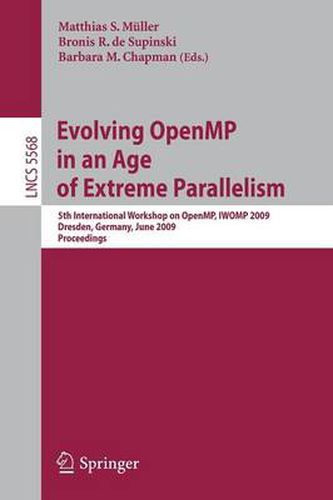Readings Newsletter
Become a Readings Member to make your shopping experience even easier.
Sign in or sign up for free!
You’re not far away from qualifying for FREE standard shipping within Australia
You’ve qualified for FREE standard shipping within Australia
The cart is loading…






This title is printed to order. This book may have been self-published. If so, we cannot guarantee the quality of the content. In the main most books will have gone through the editing process however some may not. We therefore suggest that you be aware of this before ordering this book. If in doubt check either the author or publisher’s details as we are unable to accept any returns unless they are faulty. Please contact us if you have any questions.
OpenMP is an application programming interface (API) that is widely accepted as a de facto standard for high-level shared-memory parallel programming. It is a portable, scalable programming model that provides a simple and ?exible interface for developing shared-memory parallel applications in Fortran, C, and C++. Since its introduction in 1997, OpenMP has gained support from the - jority of high-performance compiler and hardware vendors. Under the direction of the OpenMP Architecture Review Board (ARB), the OpenMP speci?cation is undergoing further improvement. Active research in OpenMP compilers, r- time systems, tools, and environments continues to drive OpenMP evolution.To provideaforumforthedisseminationandexchangeofinformationaboutand- periences with OpenMP, the community of OpenMP researchersand developers in academia and industry is organized under cOMPunity (www.compunity.org). This organization has held workshops on OpenMP since 1999. This book contains the proceedings of the 5th International Workshop on OpenMP held in Dresden in June 2009. With sessions on tools, benchmarks, applications, performance and runtime environments it covered all aspects of the current use of OpenMP. In addition, several contributions presented p- posed extensions to OpenMP and evaluated reference implementations of those extensions. An invited talk provided the details on the latest speci?cation dev- opment inside the Architecture Review Board. Together with the two keynotes about OpenMP on hardware accelerators and future generation processors it demonstrated that OpenMP is suitable for future generation systems.
$9.00 standard shipping within Australia
FREE standard shipping within Australia for orders over $100.00
Express & International shipping calculated at checkout
This title is printed to order. This book may have been self-published. If so, we cannot guarantee the quality of the content. In the main most books will have gone through the editing process however some may not. We therefore suggest that you be aware of this before ordering this book. If in doubt check either the author or publisher’s details as we are unable to accept any returns unless they are faulty. Please contact us if you have any questions.
OpenMP is an application programming interface (API) that is widely accepted as a de facto standard for high-level shared-memory parallel programming. It is a portable, scalable programming model that provides a simple and ?exible interface for developing shared-memory parallel applications in Fortran, C, and C++. Since its introduction in 1997, OpenMP has gained support from the - jority of high-performance compiler and hardware vendors. Under the direction of the OpenMP Architecture Review Board (ARB), the OpenMP speci?cation is undergoing further improvement. Active research in OpenMP compilers, r- time systems, tools, and environments continues to drive OpenMP evolution.To provideaforumforthedisseminationandexchangeofinformationaboutand- periences with OpenMP, the community of OpenMP researchersand developers in academia and industry is organized under cOMPunity (www.compunity.org). This organization has held workshops on OpenMP since 1999. This book contains the proceedings of the 5th International Workshop on OpenMP held in Dresden in June 2009. With sessions on tools, benchmarks, applications, performance and runtime environments it covered all aspects of the current use of OpenMP. In addition, several contributions presented p- posed extensions to OpenMP and evaluated reference implementations of those extensions. An invited talk provided the details on the latest speci?cation dev- opment inside the Architecture Review Board. Together with the two keynotes about OpenMP on hardware accelerators and future generation processors it demonstrated that OpenMP is suitable for future generation systems.